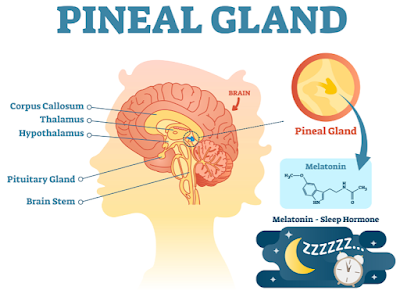The pineal gland—often called the "third eye"—is a tiny but mighty structure deep within the brain. Best known for producing melatonin, it orchestrates our sleep-wake cycles, influences mood, and even plays a role in hormone balance and neuroprotection. But modern lifestyles, environmental toxins, and aging can compromise its function. Enter nootropics: brain-boosting supplements that may offer targeted support for pineal gland health and performance.
Why the Pineal Gland Matters
The pineal gland’s primary job is to synthesize melatonin, the hormone that regulates our circadian rhythms. When melatonin production is optimal, we sleep better, think clearer, and feel more balanced. But factors like calcification (often from fluoride or heavy metals), oxidative stress, and excessive blue light exposure can hinder the gland’s performance, leading to sleep disturbances, mood swings, and even cognitive decline.
How Nootropics Can Support the Pineal Gland
1. Boosting Melatonin Naturally
Some nootropics enhance the body’s own melatonin production by supporting the serotonin pathway. For example:
5-HTP and L-tryptophan: These amino acids are precursors to serotonin, which the pineal gland converts into melatonin.
Montmorency tart cherry: A natural source of melatonin, this supplement can help reinforce healthy sleep cycles without synthetic additives.
2. Detoxifying and Decalcifying the Pineal Gland
Over time, the pineal gland can accumulate calcium deposits (calcification), often aggravated by environmental toxins like fluoride and heavy metals. Nootropics that support detoxification include:
Chlorella and spirulina: These algae bind to and help eliminate heavy metals from the body.
Tamarind and iodine: These ingredients, found in advanced formulations, can increase urinary excretion of fluoride, reducing calcification risk.
3. Providing Neuroprotection and Antioxidant Support
Melatonin itself is a powerful antioxidant, but certain nootropics can further shield the pineal gland from oxidative damage:
Lion’s mane mushroom and bacopa monnieri: These herbs promote brain cell repair and connectivity, supporting overall brain health.
Pine bark extract and moringa: Potent antioxidants that help neutralize free radicals and reduce neurodegenerative risk.
4. Supporting Circadian Rhythm and Sleep Quality
Modern life often disrupts our natural sleep patterns. Nootropics can help realign the circadian rhythm:
Melatonin supplements: Useful for shift workers or those experiencing jet lag, but best used occasionally to avoid suppressing natural production.
Adaptogens like ashwagandha: Help the body adapt to stress and support restful sleep.
Holistic Formulations for Pineal Health
Some supplements, such as Pineal Guard, Pineal Pure, and Pineal XT, combine multiple nootropics for a comprehensive approach:
Detox phase: Ingredients like chlorella and tamarind clear out toxins.
Repair phase: Pine bark extract and moringa help restore tissue health.
Activation phase: Shilajit and ginkgo biloba may enhance pineal activity and mental clarity.
These multi-phase formulas are designed to address the full spectrum of pineal gland challenges, from detoxification to performance optimization.
Key Takeaways for Pineal Performance
Synergy matters: Multi-ingredient nootropics often outperform single compounds by addressing detox, hormonal balance, and neuroprotection together.
Balance is key: While supplements can help, lifestyle practices—like minimizing blue light at night and maximizing daylight exposure—are crucial for pineal health.
Conclusion
The pineal gland is central to our well-being, influencing everything from sleep quality to cognitive sharpness. Nootropics offer a promising toolkit for supporting its function through natural melatonin enhancement, detoxification, and neuroprotection. For those seeking to unlock their full mental and physical potential, supporting the pineal gland with targeted nootropics—and healthy habits—may be the next frontier in brain optimization.






0 Comments
Thanks much for your comment! I'm glad to hear you're finding the content of interest. I hope it continues to be beneficial for you. Your feedback is greatly appreciated and helps me keep improving.